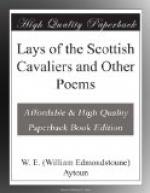The Lowland and foreign troops which formed the second line were powerless to retrieve the disaster. All was over. The rout became general, and the Prince was forced from the field, which he would not quit, until dragged from it by his immediate bodyguard.
Such was the last battle, the result of civil war, which has been fought on British soil. Those who were defeated have acquired as much glory from it as the conquerors—and even more, for never was a conquest sullied by such deeds of deliberate cruelty as were perpetrated upon the survivors of the battle of Culloden. It is not, however, the object of the present paper to recount these, or even the romantic history or hairbreadth escapes of the Prince, whilst wandering on the mainland and through the Hebrides. Although a reward of thirty thousand pounds—an immense sum for the period—was set upon his head—although his secret was known to hundreds of persons in every walk of life, and even to the beggar and the outlaw—not one attempted to betray him. Not one of all his followers, in the midst of the misery which overtook them, regretted having drawn the sword in his cause, or would not again have gladly imperilled their lives for the sake of their beloved Chevalier. “He went,” says Lord Mahon, “but not with him departed his remembrance from the Highlanders. For years and years did his name continue enshrined in their hearts and familiar to their tongues, their plaintive ditties resounding with his exploits and inviting his return. Again, in these strains, do they declare themselves ready to risk life and fortune for his cause; and even maternal fondness—the strongest, perhaps, of all human feelings—yields to the passionate devotion to Prince Charlie.”
The subsequent life of the Prince is a story of melancholy interest. We find him at first received in France with all the honours due to one who, though unfortunate, had exhibited a heroism rarely equalled and never surpassed: gradually he was neglected and slighted, as one of a doomed and unhappy race, whom no human exertion could avail to elevate to their former seat of power; and finally, when his presence in France became an obstacle to the conclusion of peace, he was violently arrested and conveyed out of the kingdom. There can be little doubt that continued misfortune and disappointment had begun very early to impair his noble mind. For long periods he was a wanderer, lost sight of by his friends and even by his father and brother. There are fragments of his writing




